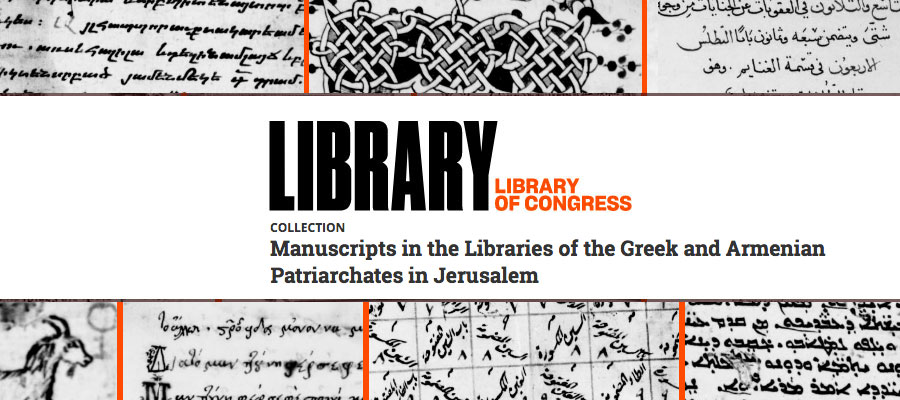As Jerusalem, the location of Christ’s Passion, has been central to the Christian religion since its inception, all the early churches sought a presence in that storied and holy city. The Greek Orthodox Church and the Armenian Apostolic Church, for example, both maintain ancient patriarchates in Jerusalem and both have created renowned libraries in them.
In 1949 Kenneth W. Clark arrived in Jerusalem to begin a project that would microfilm manuscripts from the great libraries of the Middle East under the auspices of the Library of Congress and the American Schools of Oriental research. In Jerusalem, his team examined the Greek Patriarchate’s collection of 2,400 manuscripts in 11 languages and chose 998 to be filmed in their entirety. From the 4,000 manuscripts then in the custody of the Armenian Patriarchate, the team chose 32. Finally, the group also prepared under his direction a Checklist of Manuscripts in the Libraries of the Greek and Armenian Patriarchates in Jerusalem Microfilmed for the Library of Congress (1949-1950), which gave researchers access to both the microfilmed manuscript and the black and white transparencies of select illuminations in them. The microfilm collection is in the custody of the Humanities and Social Sciences Division, where it still may be requested.
Since its appearance, the Manuscripts in the Libraries of the Greek and Armenian Patriarchates in Jerusalem Collection and the companion collections from Mt. Sinai and Mt. Athos have been so widely consulted by scholars around the globe that the Library has now digitized the microfilms to facilitate their use by scholars worldwide. At the same time the descriptions of the manuscripts as found in the Checklist have also been edited and updated.
From the Greek patriarchate, Clark’s group also chose 755 illuminations from 998 manuscripts (pages 25–32 of the Checklist) and from the Armenian Patriarchate, 432 illuminations from 22 manuscripts (pages 41–44 of the Checklist) to be photographed in 4 x 5 inch black and white format. These have not been digitized at this time but are available to researchers in the Prints and Photographs Division of the Library of Congress.
Researchers may now consult and download the digitized versions of these manuscripts or order microfilm reproductions through Duplication Services.
Learn More & Explore